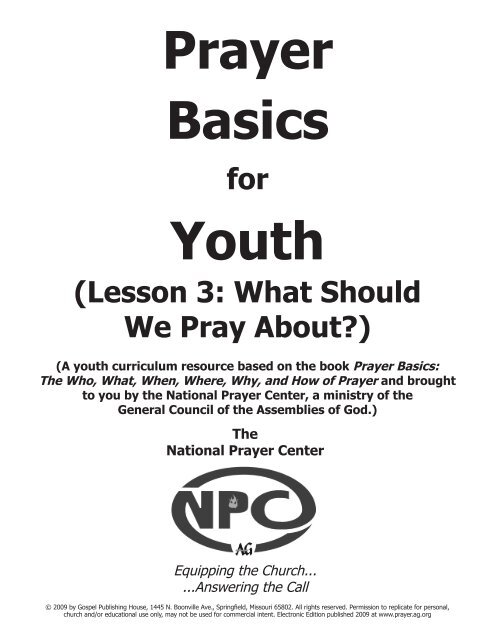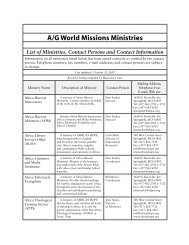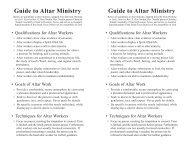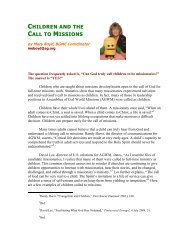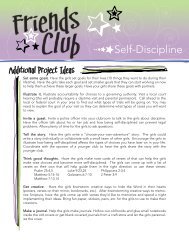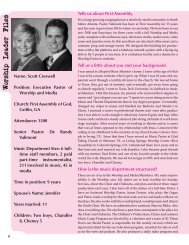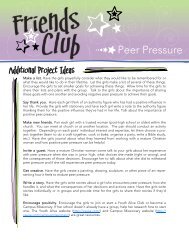Prayer Basics Youth - AG Web Services
Prayer Basics Youth - AG Web Services
Prayer Basics Youth - AG Web Services
Create successful ePaper yourself
Turn your PDF publications into a flip-book with our unique Google optimized e-Paper software.
<strong>Prayer</strong><br />
<strong>Basics</strong><br />
for<br />
<strong>Youth</strong><br />
(Lesson 3: What Should<br />
We Pray About?)<br />
(A youth curriculum resource based on the book <strong>Prayer</strong> <strong>Basics</strong>:<br />
The Who, What, When, Where, Why, and How of <strong>Prayer</strong> and brought<br />
to you by the National <strong>Prayer</strong> Center, a ministry of the<br />
General Council of the Assemblies of God.)<br />
The<br />
National <strong>Prayer</strong> Center<br />
Equipping the Church...<br />
...Answering the Call<br />
© 2009 by Gospel Publishing House, 1445 N. Boonville Ave., Springfield, Missouri 65802. All rights reserved. Permission to replicate for personal,<br />
church and/or educational use only, may not be used for commercial intent. Electronic Edition published 2009 at www.prayer.ag.org
<strong>Prayer</strong> <strong>Basics</strong> For <strong>Youth</strong><br />
LESSON 3: Tell It All to God<br />
STUDY TEXT:<br />
Psalm 34:18; 139:7-14; Matthew 6:9-13; 21:22; Luke 6:27-31; Ephesians 3:20,21;<br />
Philippians 4:6,14-19; James 1:5; 5:14-16; 1 John 5:14<br />
OBJECTIVE:<br />
WHAT is the point? God wants us to take every problem and crisis to Him in prayer.<br />
WHY is it important? Sometimes emotions like guilt, fear, and doubt can leave us wondering<br />
if God really wants to listen to our prayers.<br />
HOW should I respond? Accept God’s promise that He hears your prayers, and seek<br />
Him no matter what problem, challenge, or need you’re<br />
facing.<br />
KEY VERSE: Philippians 4:6<br />
In everything, by prayer and petition, with thanksgiving, make your requests known to God<br />
(NIV).<br />
Getting Started<br />
ACTIVITY: You Can Trust Me<br />
Before class, gather several treats that most teens would like, such as pieces of candy or<br />
slices of fruit. Also place in a sealed container a food item that smells terrible. Examples<br />
include limburger cheese, sauerkraut and vinegar, or sour milk. As class begins, ask for three<br />
volunteers and announce that you will be testing how much they trust you. Dismiss them<br />
from the room, along with someone who will blindfold them while they are out. Meanwhile,<br />
explain to the class that you will approach each blindfolded volunteer with reassuring words<br />
as you open the container of smelly food under their noses. Then you will place candy or<br />
fruit in their mouths. (Use a plastic spoon or fork rather than touching it.) Instruct students<br />
to gasp, groan, and shout “Oh, gross!” as you proceed. Then bring in the volunteers and<br />
go through the activity. Note if any actually trust you enough to refrain from removing the<br />
blindfold. Then discuss these questions.<br />
• How did you (volunteers) feel just before I put the candy/fruit in your<br />
mouth? Was it difficult to trust? Explain. (Invite responses, noting that most<br />
people would have a hard time trusting in this situation, even with someone they’ve<br />
known for awhile.)<br />
• (Directed at the rest of the students.) Do you think you could have kept the<br />
blindfold on? Why or why not?<br />
• How well would you have to know someone before you would trust them to<br />
honor their word and not put something gross in your mouth in that situation?<br />
(Note that most people would have to build a solid, trusting friendship with someone<br />
before they’d overlook a terrible smell as that person placed a strange object in their<br />
mouths.)<br />
© 2009 by Gospel Publishing House, 1445 N. Boonville Ave., Springfield, Missouri 65802. All rights reserved. Permission to replicate for personal,<br />
church and/or educational use only, may not be used for commercial intent. Electronic Edition published 2009 at www.prayer.ag.org
EXPLAIN:<br />
Trust is an extremely important part of any relationship, and that’s especially true in our<br />
relationship with God. But when we’re faced with challenges, doubts, and distractions, trust<br />
can be a struggle. That’s where prayer comes in. He wants to hear every issue, temptation,<br />
and problem we’re facing. We can tell Him anything, then trust Him to respond.<br />
Digging Deeper<br />
1. God Cares About What You’re Facing<br />
ACTIVITY: What Are the Odds?<br />
Announce to students that you are going to read a list of accidents, misfortunes, and crises<br />
that any of us may or may not face. Their assignment is to guess what the odds are that they<br />
will experience each of these events. See who comes closest on each one. For fun, you might<br />
also discuss how you could make your odds better for each. If you choose, keep track of who<br />
comes closest most often and award a prize at the end.<br />
• The odds of being hit by lightning during your lifetime? (1 in 9,000)<br />
• The odds of dying from a snake bite, bee sting, or other venom attack? (1 in 100,000)<br />
• The odds of dying from a dog attack? (1 in 150,000)<br />
• The odds of being struck by a meteor in the next year? (1 in 5,000,000,000)<br />
• The odds that you will get heartburn today? (1 in 150)<br />
• The odds that you will someday hurt yourself shaving so badly that you need<br />
medical attention? (1 in 7,000)<br />
• The odds of mistakenly being declared dead because of a clerical error? (1 in 24,000)<br />
• The odds of being injured in a shark attack? (1 in 600,000)<br />
• The odds of getting in a car accident during the first year you have a license? (1 in 5)<br />
EXPLAIN:<br />
We all face a lot of problems every day. And while they might not fall into the category of<br />
“being hit by a meteor,” they are serious nonetheless. How we respond to those crises says<br />
a lot about where we’ve placed our hope and trust. When we turn to prayer, we will not be<br />
disappointed—no matter the size of the problem.<br />
• Nothing is too big for God.<br />
READ:<br />
Ephesians 3:20,21<br />
DISCUSS:<br />
Ask students to name some of the biggest problems, fears, and worries they’ve had to face—<br />
or often find themselves thinking about facing. Then talk about how they responded. Finally,<br />
discuss why a Christian might hesitate to pray in hard times. Explain that sometimes the issue<br />
seems so huge that we don’t even understand what is happening, or what could be done to<br />
change things. We’re tempted to conclude that there are no answers. It’s a hopeless cause.<br />
ASK:<br />
“What do you think verse 20 means when it says God is able to do ‘more than all we ask or<br />
think’?” (We shouldn’t limit our prayers to what we understand. Nothing we ask is ever so<br />
great that it overwhelms His ability to respond effectively. He knows the future, sees the whole<br />
picture, and controls every circumstance. When life seems overwhelming or hopeless, put your<br />
trust in God by making prayer your first priority.)<br />
© 2009 by Gospel Publishing House, 1445 N. Boonville Ave., Springfield, Missouri 65802. All rights reserved. Permission to replicate for personal,<br />
church and/or educational use only, may not be used for commercial intent. Electronic Edition published 2009 at www.prayer.ag.org
• God cares no matter the situation.<br />
PONDER:<br />
Invite students to think of a moment in their lives that was so shocking or frightening that it<br />
seemed to take their breath away. Maybe they learned that someone close was getting divorced,<br />
or they received a terrible and unexpected medical report. Were they tempted to wonder if God<br />
still cared about them, and about the situation? Why might someone have that temptation, and<br />
what could be done to overcome it?<br />
READ:<br />
Psalm 139:7-13<br />
DISCUSS:<br />
Talk about the promises these verses give us: no matter what happens to us, no matter where<br />
we are in life, God is there. How can we be so sure? Because God himself made us, and did<br />
so carefully and with purpose. Then discuss how knowing these things will affect our prayers.<br />
Note that no matter our situation, our problem, or even our emotional state, God is there. He<br />
doesn’t laugh us off if we sound desperate. He doesn’t reject us because we’re inadequate. We<br />
can freely approach Him with any need.<br />
2. He Listens to the Small Things<br />
ASK:<br />
Invite students to think about times when they’ve had a problem that really weighed them<br />
down, then shared that issue with a friend or relative, only to be brushed off with a response<br />
like, “Don’t sweat it,” or “It’ll be all right,” or maybe even “If you think that’s bad, listen to<br />
what happened to me...” Talk about how they felt at that moment.<br />
EXPLAIN:<br />
It hurts when someone—especially someone close to us—ignores or minimizes our problems. What<br />
seems small to someone else can be anything but small to us. For example: our parents seem to<br />
be fighting a lot more lately. We need to do well on a test to keep our GPA at scholarship level. We<br />
just had a serious argument with a close friend, who now seems to be avoiding us. When people<br />
brush off issues like these, we might be tempted to wonder if anyone really cares...if our feelings<br />
even matter. But we can know they matter to God—enough that He wants to hear about them.<br />
READ:<br />
Have three students each read one of the following Scriptures: Matthew 21:22; 1 John<br />
5:14; Philippians 4:6.<br />
DISCUSS:<br />
Talk about how each of the three Scriptures just read can help teens feel confident and<br />
filled with faith when they pray about problems facing them, even if these problems<br />
might not seem serious to others. Use the following as a guide if necessary:<br />
• Matthew 21:22: <strong>Prayer</strong> gives us incredible access to God. We can pray with confidence<br />
and assurance. This verse doesn’t limit our prayers to things we find important, others find<br />
important, or we wonder if God will find important.<br />
• 1 John 5:14: The only “qualification” to our prayers is that we’re not violating God’s plan for<br />
us. While we must eliminate selfish and wrongly motivated prayers, we can know that God<br />
hears us when our hearts are focused on Him.<br />
• Philippians 4:6: God gives us a clear invitation to pray that doesn’t depend on who we are<br />
or how important anyone thinks our needs are.<br />
© 2009 by Gospel Publishing House, 1445 N. Boonville Ave., Springfield, Missouri 65802. All rights reserved. Permission to replicate for personal,<br />
church and/or educational use only, may not be used for commercial intent. Electronic Edition published 2009 at www.prayer.ag.org
3. Nothing Is Off-Limits When We Pray<br />
PONDER:<br />
Have students complete these sentences. (Due to the personal nature, avoid a lot of<br />
discussion on the third question. You might talk about it in general, however.):<br />
• For me to trust someone, I have to know that they________________ .<br />
• The things I value most in a relationship include _________________ .<br />
• The things that I find most difficult to discuss with others include __________.<br />
EXPLAIN:<br />
Our relationship with God is personal. While He’s the all-powerful Creator of the Universe, He’s<br />
also a close friend, confidant, trusted Counselor, and wise guide. Like our closest of friends,<br />
nothing is out of bounds when we have conversation with Him. We can talk about needs,<br />
fears, hopes for the future, as well as problems and temptations. And because He’s the perfect<br />
friend, unable and unwilling to let us down or fail to honor His promises, we can talk to Him<br />
with full assurance that He listens, ready and willing to respond. It’s with this perspective on<br />
prayer that we can examine the most familiar prayer in the Bible: the Lord’s <strong>Prayer</strong>.<br />
READ:<br />
Have a student or students read Matthew 6:9-13, then Discuss what each section of the<br />
Lord’s <strong>Prayer</strong> tells us about the conversation we can have with God. Talk specifically about<br />
how learning these principles can free us to take anything to the Lord in prayer without fear of<br />
rejection or disappointment. (The specific statements are listed below.)<br />
• Our Father in heaven...: While we need to be respectful when we pray, prayer is a personal<br />
conversation between Father and child. Do you struggle to see God this way? Let this prayer<br />
remind you that God is close by, and there is nothing you can’t tell Him.<br />
• ...hallowed be your name...: What an incredible concept: the holy God and Creator of the<br />
universe wants to talk to us. How will knowing we have this kind of access change the way<br />
we pray, including our attitude toward prayer?<br />
• ...your kingdom come...: God wants us to pray with an eternal perspective in mind. Yes,<br />
we face a lot of needs and issues every day. But how will our outlook change when we pray<br />
consistently for Christ’s return, and to see God’s grace overcome evil in people’s lives?<br />
• ...your will be done on earth as it is in heaven...: This prayer is two-fold: We pray that<br />
God’s commands will be honored and obeyed, and we pray that His plans for the world,<br />
salvation, and eternity are accomplished. This isn’t always easy; sometimes His will conflicts<br />
with what we want. So, in a sense, God is telling us to examine our priorities when we pray.<br />
• ...give us today our daily bread...: We all have needs. Some Christians around the world<br />
literally don’t know where there next meal is coming from. But even for us not in that situation,<br />
this phrase reminds us that God is in control of every need. We must surrender ourselves to<br />
His plans, knowing He will give us what we need, and what He wants us to have—even if that<br />
means not having some of the luxuries and comforts we want.<br />
• ...forgive us our debts as we also have forgiven our debtors...: Forgiveness is a<br />
big part of the Christian life. We need to confess our sins to God, then trust and accept<br />
His forgiveness. But we also need to forgive others, no matter what they’ve done. If we<br />
refuse, we will build a destructive wall in our relationship with God.<br />
• ...lead us not into temptation, but deliver us from the evil one...: The Christian life<br />
is filled with spiritual warfare (Ephesians 6:10-14). What are some of the battles we face?<br />
Whatever the case, we need God’s help. This prayer means we ask God to spare us from<br />
harsh tests, recognizing we are weak. But it also involves trusting God (not relying on self) to<br />
see us through to a good conclusion when we do have to wage battle in the spiritual realm.<br />
© 2009 by Gospel Publishing House, 1445 N. Boonville Ave., Springfield, Missouri 65802. All rights reserved. Permission to replicate for personal,<br />
church and/or educational use only, may not be used for commercial intent. Electronic Edition published 2009 at www.prayer.ag.org
4. It’s Time To Take Action<br />
ACTIVITY:<br />
Invite students to describe the most difficult job or task they’ve ever had to do. Note that<br />
there are many different reasons a job or assignment can be hard: it’s complicated, it involves<br />
really hard labor, or maybe it’s extremely gross. Whatever the case, after they’ve shared, vote<br />
to see what example the rest of the class would least want to do. Then Discuss what would<br />
have happened if they didn’t do the job. (They would have lost their job; parents would have<br />
been mad; the bathroom would have completely flooded.) Emphasize that there are times<br />
we need to take action when something needs to be done—no matter how tempting it is to do<br />
something else. This is especially true with prayer.<br />
READ:<br />
Have students read the following Scriptures as a class or in small groups. Note that each<br />
passage deals with a specific situation when we need to pray. For each, talk about why<br />
we might be tempted to overlook prayer. Then discuss why it’s important for us to pray<br />
in these situations. Note that God has invited us to pray in all situations, no matter how<br />
desperate or frightening.<br />
• James 5:14-16: When praying for healing, we might worry how we will feel if a miracle<br />
doesn’t happen. But this can be a desperate situation. And God wants to hear from us.<br />
• Philippians 4:14-19: It can be embarrassing to pray about a financial need in our family,<br />
especially when praying with others. But true Christian friends won’t look down on us when<br />
we have this kind of need. God has an unlimited supply, and He wants to take care of us.<br />
• Psalm 34:18; Luke 6:27-31: Sadly, some people resist praying about broken relationships<br />
because they want to get even with someone who hurts them, or they fear God will tell them<br />
to go apologize to the other person. But God doesn’t want us to have bad feelings against<br />
anyone. And He can restore any relationship.<br />
• James 1:5: It’s not uncommon to worry or be confused about the future, and where our lives<br />
are heading. We might even be tempted to wonder if there’s a lot we can accomplish with our<br />
lives. But God has incredible plans for us. And He wants to give us wisdom to follow those plans.<br />
Making It Real<br />
MINISTRY ACTIVITY:<br />
Take specific prayer requests from students, perhaps noting the specific categories of prayer<br />
needs mentioned above. Also note prayer needs you might know about from your church<br />
congregation. Note these needs on the board. Then gather students together and have a<br />
time of intercession when they pray for one another. They might also use this time to talk<br />
with one another about the fears or concerns they’re feeling, as well as share some great<br />
things God has been doing. Encourage them to continue praying for these needs during the<br />
week. (You might have them record the requests on sheets of paper to place in their Bibles<br />
as reminders during their prayer times. Also, consider encouraging them to stay in touch<br />
with one another during the week to offer encouragement and reassurance that they are<br />
continuing to pray.)<br />
© 2009 by Gospel Publishing House, 1445 N. Boonville Ave., Springfield, Missouri 65802. All rights reserved. Permission to replicate for personal,<br />
church and/or educational use only, may not be used for commercial intent. Electronic Edition published 2009 at www.prayer.ag.org<br />
All scripture quotations, unless otherwise indicated, are taken from the HOLY BIBLE, NEW INTERNATIONAL VERSION®. NIV®. Copyright © 1973,<br />
1978, 1984 by International Bible Society. Used by permission of Zondervan. All rights reserved.


